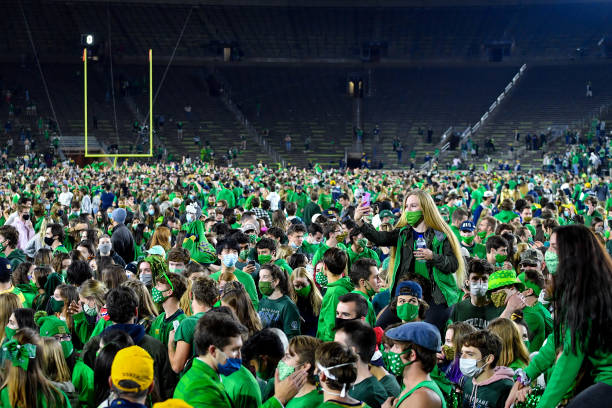A Notre Dame Student’s Response to Scathing Coverage of the University by the Media
December 4, 2020
The University of Notre Dame has had to deal with the prevalent issue of housing and educating their students in the trying times of the COVID-19 pandemic, while additionally being given national attention from the press about its controversial handling involving Father John Jenkins. Notre Dame has seemingly been made the poster child for schools that have not handled the situation effectively, but does the University deserve much of the negative attention it’s getting? Tessa Newman is a sophomore at the school in question and has had to deal with the virus first-hand. Tessa was interviewed and she provided a much more complex and complete insight into the actual precautions being taken.
Tessa started the interview proclaiming that her optimism for the school year was present, if not surprising. She described her start to the year, saying how “seeing all the safety protocols that Notre Dame had planned gave me hope that even though the year would look different, we could safely get through the school year.”
For the majority of the school year, students have dealt with the plan that boils down to no in-person classes and extremely limited social gatherings. In the case of a student being struck ill or being in contact with one, the student is then quarantined in temporary housing off-campus. The rooms and living conditions vary for each student, as there is no feasible amount of time or money to set up consistent quarantine housing. Tessa’s situation began when her roommate tested positive, and both Tessa and her roommate were separately quarantined. “I was quarantined in an apartment in The Foundry. I was glad I had so much space to move around– I got a whole apartment, as opposed to the hotel rooms that my roommates had to stay in– but there was next to no furniture; just a bed, a desk and chair, and a single armchair” Tessa describes, when asked about her living situation. She then disclosed the ultimate length of her stay, stating that “If you are put in isolation as a close contact, as I was originally, you have to be tested on Day 1, Day 4, and Day 7 of isolation. If you test negative all three times, you are released. Unfortunately for me, I tested positive on my Day 4 test. This meant I had to stay in isolation for an additional ten days after my positive test, making my total stay a whole two weeks.”
Tessa was asked the crucial question about her thoughts on Notre Dame’s response to the pandemic, and her opinion is different than that of an outsider. She provides some needed words of praise for the university: “Notre Dame’s measures to keep us safe between cleaning, mask mandates, and outdoor spaces to hang out, are unmatched. The University has taken more health and safety precautions than I have heard any other university taking.” When asked about the negative aspects of the response, Tessa first cites the obvious controversy surrounding university president Rev. John I. Jenkins, in which Jenkins attended the nomination party at the White House in honor of the new Supreme Court Justice, Amy Coney Barrett. Jenkins was spotted un-masked at the event, which preceded him testing positive a few days later. Students were outraged by these events, and Tessa named his public actions as “blatant hypocrisy.” Tessa’s other issues stemmed from a blatant lack of communication from the university’s appointed teams. She tells how her time in the Foundry was difficult, as there was no clear way to make deliveries or acquire information. “These teams repeatedly told me different information regarding how to safely get deliveries and when I would be released” she says, thereafter clarifying that “despite the lack of clarity, the Care and Concern team was very kind and helpful when they could be.”
Her only other grievances were surrounding the communal lack of morale among the students and the staff. She states that “being positive with COVID during finals week was very difficult. I suffered from a lot of brain fog and headaches and struggled to focus, yet I was expected to take all of my finals online and within the same time frame as all other students. I felt that the lack of academic accommodations for those positive with COVID was a large issue that was completely overlooked by the University.”
Tessa described the feeling of seeing her own university being put entirely in the nation’s mailboxes as difficult and disheartening. She acknowledges that a portion of the scrutiny is deserved, but there is always room for sympathy for other shortcomings beyond Notre Dame’s direct control. “I did not want to be held personally responsible for the mistakes of the administration. It was upsetting seeing Notre Dame be continually criticized in the news when people like cleaning staff, hall staff, professors, students and more have taken so many precautions to keep everyone on campus safe.”



